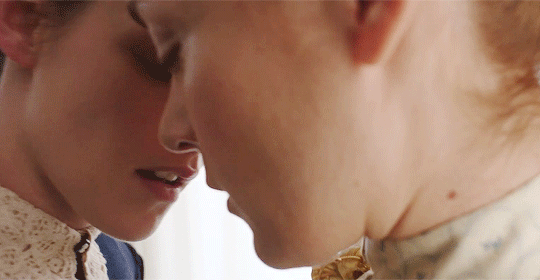Chloë Sevigny’s Lizzie Bores, Despite Big Ideas and Queer Leanings
The spitting, milky faces of our enemies, refracted, everywhere surround us. They bark and hiss out of our phones, in our very hands. It is nasty work, playing captive audience to the Patriarchy's long and gruesome striptease. We have been left with certain longings. Lizzie, the most recent installment in the long mythologizing of axe murderess Lizzie Borden, is almost a queer bloodletting we needed.
The film, which features Chloë Sevigny as the eponymous axe murderess and Kristen Stewart as Bridget, an Irish immigrant housemaid preyed upon by Mr. Borden (whose serial rape of Bridget is explicit and whose long abuse of Lizzie is suggested), draws on years of speculation that at the heart of the Borden murders lies an illicit gay affair.
It is a captivating theory, based partly on rumors that circulated during Lizzie's lifetime of a presumed affair with a well-known and husbandless actress, a handful of posthumously recovered letters addressed to a female beloved, and the fact that only Lizzie and Bridget were present in the Borden household when the murders occurred, and that Bridget was instrumental in providing the alibi that contributed to Lizzie's acquittal.
In this version, Lizzie Borden took up her axe to emancipate herself and her lover from abuse at the hands of wicked persons (Lizzie's rapist father, her complicit step-mother, and a rakish uncle bent on stealing the Borden sisters' inheritance out from under them), and in the form of oppressive economic systems (servitude in Bridget's case, sexist inheritance laws in Lizzie's). In setting white femininity against a suffocating New England which the heroine must literally carve her way out of, Lizzie recalls 2015's The Witch. But unlike that film, which is able to imbue the surfaces of repression—raw wood, white linen, woolen skies—with a visceral, erotic anxiety, Lizzie's surfaces (taffeta and stodgy wood panelling) are merely dull.
The first act of the film, which may have been entitled People Stand Around in Hallways, leans too heavily on the assumption that a woman in a Belle Époque frock holding a candle is an inherently unsettling image. The performances, Sevigny's in particular, also suffer from this botched shorthand: what looks like an attempt to play possessed and walk freakily down the hall plays in effect with all the drama of a dessert cart wheeling serenely on its rollers. Even the great Fiona Shaw, who plays Mrs. Borden, is called upon to do little more than purse her lips and look worriedly around before succumbing to Lizzie's hatchetations.
The film's ideas, which tie Mr. Borden through both his business interests (hints of shady land dealings) and his overt sexual menace to a rapacious Gilded Age capitalism against which Lizzie must assert her erotic and financial freedom are certifiably Relevant, as is the the way in which we ultimately come to understand that Lizzie is another rich white rebel who will pay for nothing, and whose strident self-emancipating gestures risk the actual lives and livelihoods of others, in this case Bridget, who suffers the ignominious fate of having to move to Montana. "You're dreamin,'" she tells Lizzie, before she goes.
Lizzie's greatest success is in painting Mr. Borden and Lizzie as horror-twins, each prone to fits of explosive violence, each in their own way entrapping Bridget in a bourgeois sexual fantasy of transgression and dominance. But these revisions, even if they succeed complicating the myth, are ultimately limited by an inert script ("You're home early," Mrs. Borden announces flatly to her husband, who is home early), and, excepting Kristen Stewart and, when she takes up her axe, Sevigny, a set of largely inert performances. The hunt for Lizzie Borden, gay icon, continues.
—
James Loop is a writer living in New York. You can find him online in Hyperallergic, the Lambda Literary Poetry Spotlight, and @jimmytheloop.
Archive
- September 2025
- August 2025
- May 2025
- February 2025
- November 2024
- October 2024
- September 2024
- August 2024
- July 2024
- June 2024
- May 2024
- April 2024
- October 2023
- July 2023
- June 2023
- May 2023
- April 2023
- March 2023
- February 2023
- June 2022
- April 2022
- March 2022
- January 2022
- December 2021
- October 2021
- September 2021
- August 2021
- July 2021
- June 2021
- May 2021
- April 2021
- March 2021
- February 2021
- January 2021
- December 2020
- October 2020
- September 2020
- August 2020
- July 2020
- June 2020
- May 2020
- April 2020
- March 2020
- February 2020
- January 2020
- December 2019
- November 2019
- October 2019
- September 2019
- August 2019
- July 2019
- June 2019
- May 2019
- April 2019
- March 2019
- February 2019
- January 2019
- December 2018
- November 2018
- October 2018
- September 2018
- August 2018
- July 2018
- June 2018
- May 2018
- April 2018
- March 2018
- February 2018
- January 2018
- December 2017
- November 2017
- October 2017
- September 2017
- August 2017
- July 2017
- June 2017
- May 2017
- April 2017
- March 2017
- February 2017
- January 2017
- December 2015
- November 2015
- October 2015
- September 2015
- August 2015
- July 2015
- June 2015
- May 2015
- April 2015










